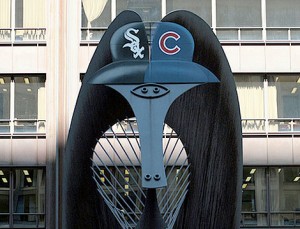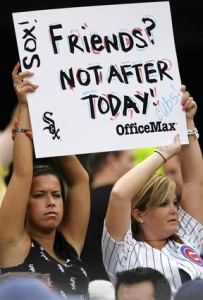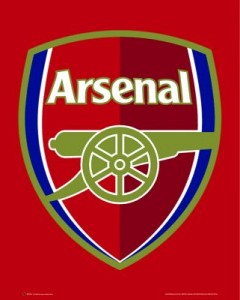By Sam Svoboda
Before I even begin, I’d just like to say that I fully expect to catch some flak for this- too many people have their opinions on the Cubs and the Sox and refuse to even think about modifying them. But with the “Crosstown Classic” again this weekend, it’s a perfect time to examine the possibility that maybe, just maybe, the city’s two baseball teams are not mutually exclusive. In other words, liking the Sox does not mean you have to hate the Cubs, and vice versa: you can actually (gasp!) like both teams.
If you haven’t already started typing out a comment degrading my sports intelligence, hear me out. I’ll start with my personal story: My paternal grandfather is a life-long Cubs fan and my maternal grandfather is a life-long Sox fan. I grew up going to games both at Wrigley and Comiskey, and listening to both Harry Caray and Hawk Harrelson. I can rattle off the names of completely forgettable Southsiders like Mike Caruso and Jorge Fabregas and Northsiders like Jose Nieves and Brant Brown (insert obligatory dropped fly ball reference here).
And when I was little no one ever told me I was wrong to grow up rooting for (aka suffering with) both teams. Maybe it was because I was a kid, and they figured eventually I’d pick one or the other. But I still don’t see the need to choose. And it’s not because I’m a “glory hunter”, thinking that supporting two teams will double my chances of success- I mean, this is Chicago baseball we’re talking about after all, where World Series titles are less frequent than Haley’s Comet. I just think that, as a born-and-bred Chicagoan and one who loves his city, why shouldn’t I root for both of the teams that are representing it?
Now, I also realize that this argument is not universal, especially as a fan of English soccer, where “derbies” between teams in the same city make the rivalry between Cubs and Sox fans look almost loving. But these are different in fundamental ways, and can actually provide contrasts that show why the Chicago baseball teams are not mutually exclusive (for simplicity, we’ll compare the Cubs and Sox to North London soccer rivals Arsenal and Tottenham).
First of all, the Cubs and Sox only play six out of their 162 games against each other (1 out of every 27 games), whereas Arsenal plays Tottenham twice in a 38 game season (1 out of 19 games- not counting the possibility that they’ll also face each other in a domestic cup competition). I’m basically the opposite of a math major, but I can tell you that the six Crosstown Classic games will not have a huge impact on the overall season. But in the Premier League, where there are no playoffs and everything is decided in the regular season, two matches can be very influential in determining a team’s fate.
More important than the different mathematical weights of games, however, is the different league structures. In the Premier League’s “single table” structure, every Tottenham match has an impact on the same standings that Arsenal are in- they’re fighting for the same spots.
With the two-league structure of MLB, though, how the Cubs are doing has zero effect on the Sox’ hopes of success, and vice versa. In fact, games against the other Chicago team mean a whole lot less than those against division rivals, or even just fellow NL or AL teams. These separate spheres mean that the success of one team does not hinder the other… unless the two play each other in the World Series again, in which case Satan will need to buy some heavy wool clothing.
This is magnified even more when you add in history. Arsenal and Tottenham have been playing each other in high stakes matches- including many in the aforementioned cup tournaments- for over a hundred years (except for the years when Tottenham have been relegated to the second division). The Cubs and Sox played each other in the 1906 World Series. Interleague play started in 1997. Suffice to say, the two teams didn’t exactly play hundreds of meaningful games between each other in those 91 interceding years.
So while they’ve occupied the same town, the Sox and the Cubs might as well have been in separate universes in baseball terms- and they still compete in separate spheres today, although they both represent our fair city. Again, I’m not naive enough to think that the above argument will make all Chicagoans love both teams, but if I’ve convinced one person….


